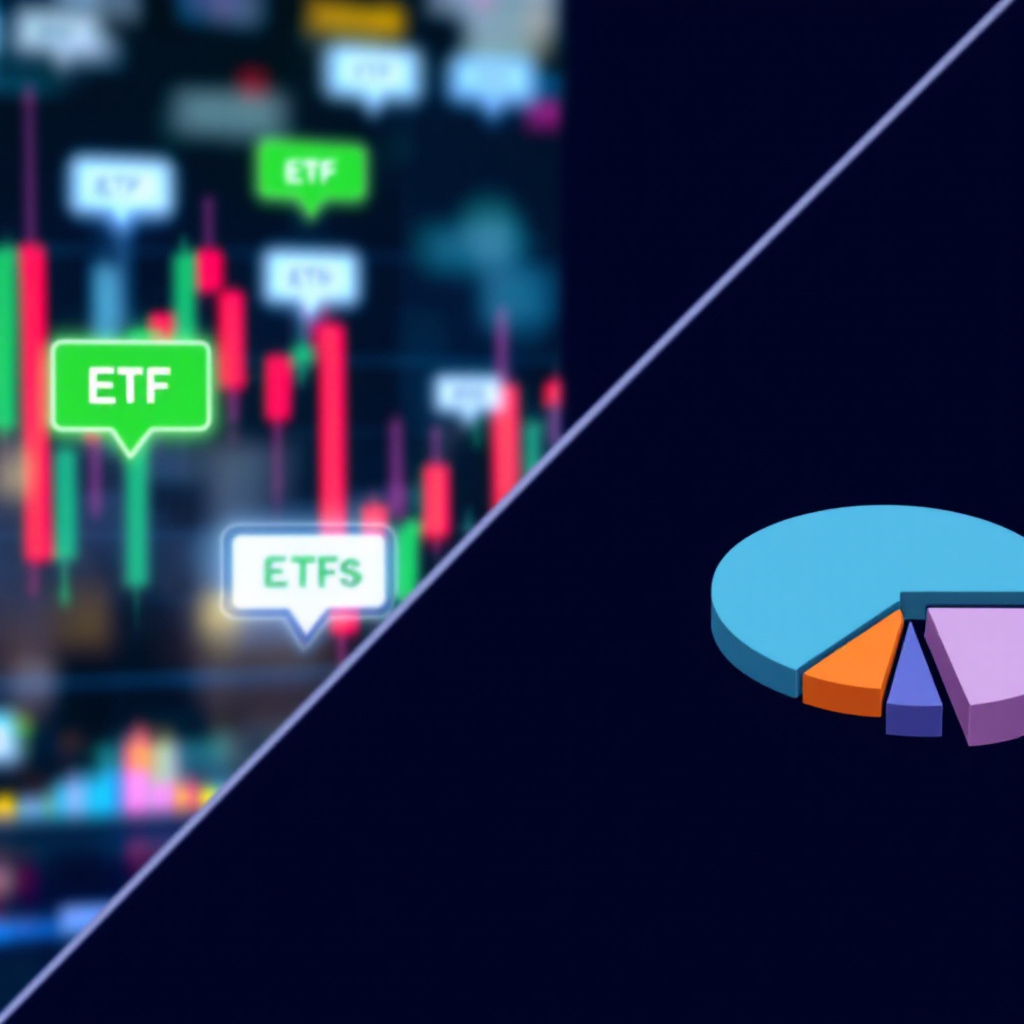Comparative Analysis ETFs vs Mutual Funds: A Deep Dive into Fees and More
When it comes to investments, there’s a plethora of choices out there, each clamoring for your hard-earned dollars. Among the sea of options, you’ll often find yourself standing at a fork in the road, pondering whether ETFs or mutual funds are the right path for you. In this Comparative Analysis ETFs vs Mutual Funds, we’ll unravel the complexities of these two popular investment vehicles, with a special spotlight on fees.
Understanding the Basics: What Sets ETFs and Mutual Funds Apart?
First things first, let’s get to know the main contenders. ETFs, or Exchange-Traded Funds, are baskets of assets traded on stock exchanges, much like individual stocks. They’re known for their flexibility, allowing investors to buy and sell throughout the trading day.
On the other hand, mutual funds pool money from multiple investors to purchase a diversified portfolio of assets. Unlike ETFs, mutual funds are only priced at the end of the trading day.
With the basics covered, let’s peel off the layers and examine these investments through various lenses, starting with their structure.

The Structural Showdown
When we talk about structure, we mean how these financial products are designed and managed.
- ETFs: Typically, ETFs have a passive investment approach, designed to track a specific index. They’re generally more transparent, giving you a clear view of the holdings within the fund at any given time.
- Mutual Funds: These can be actively managed, with fund managers constantly tweaking the portfolio in an attempt to beat the market. However, this could result in less transparency about the exact holdings.
So, if you’re someone who loves having your finger on the pulse of your investments, ETFs might just edge out mutual funds in this round.
Delving into Performance
The performance of an investment can be the make-or-break factor for many. When you’re talking ETFs vs mutual funds, one word often comes up—efficiency.
While mutual funds might boast stellar management teams, the cost of active management can eat away at returns. ETFs, with their typically lower expense ratios, often emerge as the dark horse in performance over the long haul.
But hold your horses—this isn’t to say that mutual funds don’t outperform occasionally. Some investors cherish the allure of having professionals at the helm, potentially navigating through market troughs and peaks with an astute hand.
The Cost Conundrum: Mutual Fund vs ETF Fees
Ah, fees—a topic that never fails to stir debates among investors! Let’s break it down, shall we?
- Expense Ratios: ETFs generally have lower expense ratios. They’re known for providing a cost-effective way to mirror the performance of an index.
- Load Fees: Mutual funds might come with upfront or back-end load fees. These charges can potentially erode returns over time.
- Trading Costs: While ETFs can incur brokerage fees with every buy or sell order, these can be mitigated with commission-free trading platforms that have gained popularity.
- Operational Costs: The costs of operating mutual funds can be higher due to active management and shareholder services.
When it comes to fees, ETFs often leave mutual funds feeling a tad envious. For those pinching pennies, the cost efficiency of ETFs is a huge draw.
Use Cases: When to Choose What?
Let’s glide through some scenarios to help you pick your champion.
- If You Fancy Flexibility: ETFs gain points for liquidity. Being able to trade them like stocks, you can react in real-time to market movements.
- If You’re Comfortable with a Slow Burn: Mutual funds, especially actively managed ones, could potentially add finesse to long-term investment strategies.
- If You’re Fee-Conscious: Remember the fee advantage of ETFs. Lower fees mean more of your money stays in your pocket.
- If You Value Expertise: Lean towards mutual funds if you believe in the prowess of seasoned fund managers.
Whether ETFs or mutual funds fit the bill, aligning your choice with your investment goals and appetite for risk is essential.
The Verdict: Which Wins the ETF vs Mutual Fund Duel?
Crikey! We’ve covered a lot of ground on this journey. But the question remains—who rules, ETFs or mutual funds? Well, there’s no one-size-fits-all answer. It’s like comparing apples to oranges; both juicy, yet satisfying different cravings.
If low fees and flexibility tickle your fancy, ETFs might just waltz into the limelight. But if you’re someone who trusts market maestros to direct your investment orchestra, mutual funds could be the symphony you enjoy.
In the intricate world of investing, making the right choice hinges on your personal financial narrative. Your story’s twist may have you embracing ETFs’ low-cost allure or mutual funds’ potential for active hustle.
So there you have it, the Comparative Analysis ETFs vs Mutual Funds has laid bare the nuts and bolts of these instrumental choices. Whichever road you choose, may it align with your financial goals and paint your investment aspirations in hues of prosperity.
Happy investing!
FAQs
Why do ETFs outperform mutual funds?
ETFs might triumph over mutual funds for long-term investors ready to navigate the ebb and flow of the market. Thanks to their structure, ETFs typically maintain lower fees, which can enhance returns over the long haul. However, during periods of market stress, ETFs can provide lower payoffs compared to mutual funds holding the same index because of their exposure to less liquid securities.
What are the disadvantages of ETFs compared to mutual funds?
While ETFs have their merits, they aren’t without drawbacks. Potential higher trading costs due to frequent buying and selling can be a downside. Moreover, some ETFs might offer limited diversification, and their prices can be more volatile owing to intraday trading, unlike mutual funds, which are priced at the end of the trading day.
Are ETFs more cost-effective than mutual funds?
In most cases, yes, ETFs are generally more cost-effective than mutual funds. This cost advantage arises from their typically lower expense ratios and absence of load fees. However, it’s wise for investors to meticulously compare the cost structures of both ETFs and mutual funds, as specific cases might present exceptions to this general rule.
Can I switch from mutual funds to ETFs easily?
While switching from mutual funds to ETFs is feasible, it often involves selling the mutual fund positions and purchasing ETFs, which can incur brokerage fees and tax implications. Hence, it’s crucial to evaluate the costs involved and consult with a financial advisor to ensure that it aligns with your long-term investment strategy.
Do ETFs offer as much diversity as mutual funds?
ETFs generally offer substantial diversification, often mirroring broad market indexes. However, some specialized or niche ETFs might offer less diversification compared to traditional mutual funds, which can potentially expose investors to more risk. Investors aiming for diversification should choose ETFs that align with broad-based indices or possess diversified holdings within the desired asset class.

